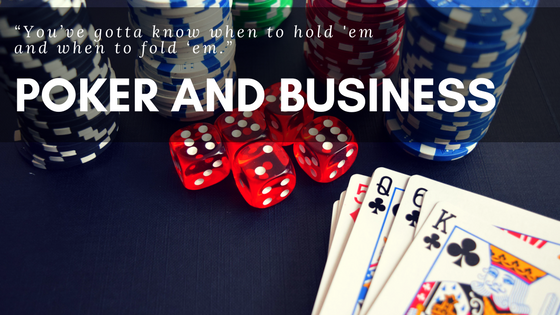Poker and business – discover the key similarities
“You’ve gotta know when to hold ’em and when to fold ‘em.”
If you have ever sat down at a table and played a few hands of poker, you will understand where we are going with this post. Being an ex-croupier, I’ve personally dealt thousands of poker hands–and played almost as many. I’ve been both an observer and an active participant. Poker is highly addictive because players love the combination of skill and chance. We will show you the similarities between poker and business. We will break down a few of the concepts into more detail.
Key Similarities
There is always an element of risk–except when you get the nuts in Poker.
There is the potential for great reward–but also heavy losses.
You pit your skills against opponents–your competitors in business.
You’re constantly
learning new skills–as your competitors do, too.
Main Difference
Poker is a zero sum game. You play against your opponents, not the casino. There is no statistical built-in house advantage. At the casino, the house takes a rake or vigorish to make a profit. In a home game, all the money flows around the table.
In business, when you make a sale, your customer is choosing you and your product over someone else.
Risk Vs Reward
There is a concept in poker known as Expected Value (EV). Based on the math, you can work out your chances of winning. Then, you can calculate if you are ahead or behind based on the pot size and how much you have to put in. With this information, you can make better, more informed decisions about whether to call and bet more money, or fold and walk away.
This same idea applies in business. You must know when to bet more money on an idea or fold and walk away from it because the EV is not there. This is one of the key reasons why most startups fail; they don’t know their EV. It’s also why struggling businesses continue to trade year after year. Both poker players and business owners suffer from the sunk cost syndrome of time and money. When new information or products become available, they often ignore the effect this has on their future EV.
Know your opponent
There are entire books and videos designed to show you how to spot a “tell” in poker. A tell is a sign that someone is bluffing or under pressure. Even some former FBI agents have written books detailing their techniques and their experience reading tells. Now that poker has gone mainstream on ESPN and is gaining classification as a sport, people are increasingly interested in learning to spot a tell for themselves. Depending on your business, this may be a very useful skill, especially if you are in sales or any kind of negotiation situation. Those who are well-versed in poker psychology are experts in the ability to observe how others play. Then, they use that information to judge how opponents might play their hand. The simplest layer of poker psychology is to watch what your opponents do when looking at or touching their cards.
Know yourself
Unlike the wealth of information available about reading other players’ tells, material about understanding yourself is not as widely taught. What makes good poker players so successful is their ability to think quickly and make accurate decisions. This is far more valuable than knowing your opponent. After all, you may only play against a certain opponent one time. You bring all your existing traits and habits with you every time you sit down at a poker table. You have to
understand yourself to know what your opponents will think about you. You have to deliberately act differently and mix up your style so that you don’t become predictable.
In business and poker there is a “status quo bias,” something we always like to do or have done a certain way. You should also beware of your own confirmation bias; don’t overvalue evidence that supports what you already believe.
Look for weaknesses
A great poker player is always looking for an edge. Any kind of advantage, however small, will add up over time. Other players will try different tactics to put you off your game. They prey on any weakness. They trash talk you and push for a reaction. So flip this. What weaknesses can you find in your competition? How can you exploit them? What can you learn? The more you understand the differences, the more you can leverage this to your advantage. In Blink, Malcolm Gladwell talks about subconscious decisions based on what you actually see but are unable to filter out. Filter the noise and learn to make better judgements. In poker and business you can always find a weakness.
Finding the sucker
There is a maxim in poker that should also apply to business: “if you can’t find the sucker at the table within 30 minutes, then it’s usually you.”
What gives you your winning edge? Share with us the skill you have that your opponent doesn’t.

